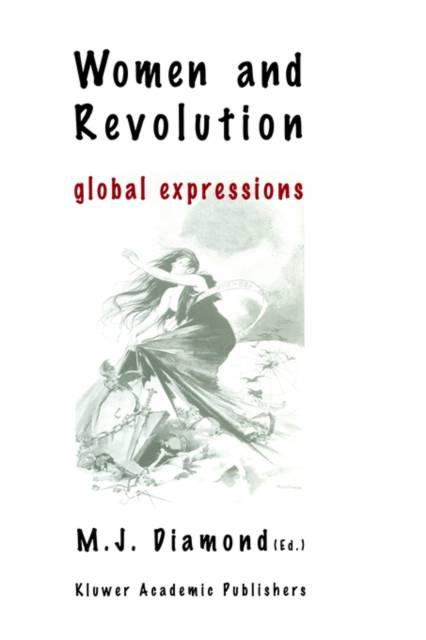
- Retrait gratuit dans votre magasin Club
- 7.000.000 titres dans notre catalogue
- Payer en toute sécurité
- Toujours un magasin près de chez vous
- Retrait gratuit dans votre magasin Club
- 7.000.0000 titres dans notre catalogue
- Payer en toute sécurité
- Toujours un magasin près de chez vous
209,95 €
+ 419 points
Description
Taking its starting point from women's contributions to the French revolution, this important anthology goes far beyond any particular historical, European or American context and expands its scope in space and time to an all-inclusive global theme, namely the contributions of radical women towards an ever-changing world and its revolutionary transformations everywhere. The superbly edited essays by diverse contributors from various continents and disciplines explore a wide platform of women's revolutionary involvements and elucidate the broad range of contributions by women scholars, scientists and activists to movements of social transformation, as well as to a reexamination of established methods of cultural analysis from enlightened liberalism to Marxism. The contributions of women scholars and activists from Africa, Asia and Latin America are particularly significant in that they transcend and expand European/North American feminism as relevant primarily to its own socio-cultural context and focus on women acting in terms of their own non-Western traditions and cultures, that is, on non-Western models based on indigenous strategies of social transformation. This rich anthology shuns any postulation of a single global model for revolution. Yet, despite the emergence of a `problematic relationship between Western or Western educated theorists and the causes of the oppressed', women's diverse social, cultural and historical experiences and strategies are united in this edition, as in their common causes, as emphasized by the following statement in the introduction: `the female body has become ... a privileged site for social analysis in the context of international capitalism as well as in the critique of traditional socialism.'
Sabine Jell-Bahlsen, Ogbuide Films
Women and Revolution covers an enormous socio-historical space, four continents - Europe, Africa, Asia and Latin America &endash; and quite a few countries within them. This huge field of human experience is looked at from the focal point which runs explicitly and implicitly through all nineteen chapters: the active if not revolutionary role women have played individually and collectively in various determining social situations, a role regularly suppressed by the coercive power of institutionalized domination. The impetus for this endeavor was the commemoration of the bicentennial of the French Revolution, an occasion to take an in-depth look at its less obvious agendas, through a focus on the activity of women, and on Olympe de Gouges in particular. But as Olympe de Gouges became acquainted with Mr. Guillotine, the considerable role of women became suppressed not only actually but as a kind of damnatio memoriae which the old Romans had already invented. As this work shows, there have been multiple forms and contents through which women have taken history into their own hands and have participated in emancipatory struggles throughout the world. They are at their best in their use of the resources of local village traditions, of dense social contexts, of mutual aid and in turning such grassroots resources into radical democratic struggles for the future. A fascinating and timely book!.
Wolf-Dieter Narr, Freie Universität Berlin
The vital role played by women in struggles for social transformation has scarcely been appreciated, and with the sense of defeat that hangs over the revolutionary project, stands to be further forgotten. That is why the publication of Women and Revolution is both welcome and necessary &endash; on intellectual and scholarly grounds, but also because these are stories which have to be told if we are to resume the march toward a better world.
Joel Kovel, Bard College
Sabine Jell-Bahlsen, Ogbuide Films
Women and Revolution covers an enormous socio-historical space, four continents - Europe, Africa, Asia and Latin America &endash; and quite a few countries within them. This huge field of human experience is looked at from the focal point which runs explicitly and implicitly through all nineteen chapters: the active if not revolutionary role women have played individually and collectively in various determining social situations, a role regularly suppressed by the coercive power of institutionalized domination. The impetus for this endeavor was the commemoration of the bicentennial of the French Revolution, an occasion to take an in-depth look at its less obvious agendas, through a focus on the activity of women, and on Olympe de Gouges in particular. But as Olympe de Gouges became acquainted with Mr. Guillotine, the considerable role of women became suppressed not only actually but as a kind of damnatio memoriae which the old Romans had already invented. As this work shows, there have been multiple forms and contents through which women have taken history into their own hands and have participated in emancipatory struggles throughout the world. They are at their best in their use of the resources of local village traditions, of dense social contexts, of mutual aid and in turning such grassroots resources into radical democratic struggles for the future. A fascinating and timely book!.
Wolf-Dieter Narr, Freie Universität Berlin
The vital role played by women in struggles for social transformation has scarcely been appreciated, and with the sense of defeat that hangs over the revolutionary project, stands to be further forgotten. That is why the publication of Women and Revolution is both welcome and necessary &endash; on intellectual and scholarly grounds, but also because these are stories which have to be told if we are to resume the march toward a better world.
Joel Kovel, Bard College
Spécifications
Parties prenantes
- Auteur(s) :
- Editeur:
Contenu
- Nombre de pages :
- 434
- Langue:
- Anglais
Caractéristiques
- EAN:
- 9780792351825
- Date de parution :
- 31-08-98
- Format:
- Livre relié
- Format numérique:
- Genaaid
- Dimensions :
- 156 mm x 234 mm
- Poids :
- 820 g

Les avis
Nous publions uniquement les avis qui respectent les conditions requises. Consultez nos conditions pour les avis.






